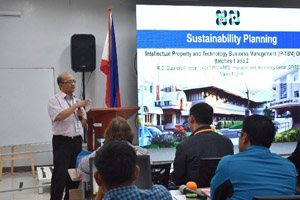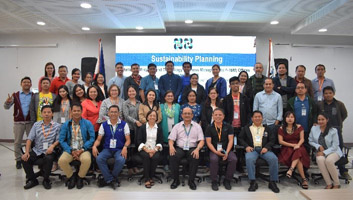 The Technology Transfer and Promotion Division (TTPD) of the Philippine Council for Agriculture, Aquatic and Natural Resources Research and Development of the Department of Science and Technology (DOST-PCAARRD) held its first sustainability planning workshop for the Intellectual Property and Technology Business Management (IP-TBM) offices.
The Technology Transfer and Promotion Division (TTPD) of the Philippine Council for Agriculture, Aquatic and Natural Resources Research and Development of the Department of Science and Technology (DOST-PCAARRD) held its first sustainability planning workshop for the Intellectual Property and Technology Business Management (IP-TBM) offices.
The workshop, which involved two batches of participants, was held on March 1, 2019 at the R.D. Guerrero III Room, DOST-PCAARRD Innovation and Technology Center (DPITC), Los Baños, Laguna.
The activity gathered all 26 IP-TBM offices from different state universities and colleges (SUCs) and research and development institutes (RDIs) to craft short- and long-term strategies that will advance the sustainability of the IP-TBM program.
PCAARRD Acting Executive Director Dr. Reynaldo V. Ebora advised the group to craft a sound commercialization plan of the agency’s intellectual property (IP) assets by taking into consideration the term of protection of the IPs, market considerations, business strategies, and technology commercialization mode (licensing, start-up, spin-off, or outright sale).
“Commercialization strategies should not be commodity-based but should focus on the IPs that can be generated from the technology/product, and it should be aimed at extracting the economic value from these IPs,” Ebora said.
A survey form helped assess PCAARRD’s impact on the IP-TBM offices’ operations before and during the implementation. It also detailed their concerns, plans, activities, and need for further assistance.
TTPD officer-in-charge Noel A. Catibog emphasized that the team aimed to produce more success stories from the IP-TBM program. The first step in this endeavor is ensuring that IP-TBM offices are adequately capacitated and well-equipped so that they can stand independently as an office in the future.
 The first batch of the IP-TBM offices included: Cavite State University (CvSU), Bataan Peninsula State University (BPSU), Benguet State University (BSU), Bicol University (BU), Capiz State University (CAPSU), Central Luzon State University (CLSU), Philippine Rice Research Institute (PhilRice), University of the Philippines Los Baños (UPLB), University of the Philippines Visayas (UPV), and University of Southeastern Philippines (USeP).
The first batch of the IP-TBM offices included: Cavite State University (CvSU), Bataan Peninsula State University (BPSU), Benguet State University (BSU), Bicol University (BU), Capiz State University (CAPSU), Central Luzon State University (CLSU), Philippine Rice Research Institute (PhilRice), University of the Philippines Los Baños (UPLB), University of the Philippines Visayas (UPV), and University of Southeastern Philippines (USeP).
The agencies included in the second batch were: Forest Products Research and Development Institute (FPRDI), Ifugao State University (IFSU), Mariano Marcos State University (MMSU), Isabela State University (ISU), Nueva Vizcaya State University (NVSU), Philippine Carabao Center (PCC), Pampanga State Agricultural University (PSAU), Laguna State Polytechnic University (LSPU), Western Philippines University (WPU), Bohol Island State University (BISU), Samar State University (SSU), Western Mindanao State University (WMSU), Central Mindanao University (CMU), University of Southern Mindanao (USM), Caraga State University (CSU), Iligan Institute of Technology (IIT), and Mindanao State University (MSU).
